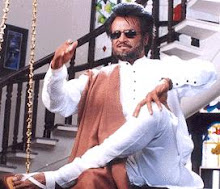A New Theory of Life
(Spike informs me via email of a couple of facts that I've gotten wrong. The post has been suitable modified and his email has been reproduced at the bottom of this post.
***
Now, I've been giving a lot of thought to philosophy and all things related - especially, the Purpose (or lack thereof), the Meaning (or lack thereof), the Answer (or lack thereof) and the Question (or lack thereof) of life. Now, it all boils down to one issue, ok, maybe two - first, reorganising one's life based on devotional serials on Sun TV, and second, the secret of sweetening cappuccino served at Barista? The latter is still waiting to be solved - my last experiments involved three sachets of Barista sugar. The former, whose mysteries have been unlocked, will be discussed in detail here.
Now, devotional serials are of two sorts - the Traditional School and the Adventurous School. In the Traditional School, a well-known mythological tale is re-enacted for educational/ recreational purposes. Lots and lots of gold paper, fake jewellery, cardboard sets, bare-chested men, and overly made-up men are employed to generate feelings of unimaginable devotion  amongst the masses. While the venture sometimes succeeds, often, it only generates mass narcelepsy and acute cases of chronic boredom. A good case in point is the new and 'improved' Ramayan, where Rama's wedding (in an
amongst the masses. While the venture sometimes succeeds, often, it only generates mass narcelepsy and acute cases of chronic boredom. A good case in point is the new and 'improved' Ramayan, where Rama's wedding (in an bizarre accurate interpretation, princesses were found for the other three princes at the same time - orey kalliley naalu maanga) was shot over five episodes in excruciating detail. This even included a whole ten-minute segment where the everyone looks at wedding photographs. Sharp, aren't you? There were no photos at the time. You're puzzled aren't you? Well, technology, it seems, was available - highly skilled painters painted each scene, and such paintings were on display! Only, the paintings looked at lot like they were Photoshopped photographs.
Life, we gather, from these serials, is gloriously fake. It is the world's worst illusion. And the production values are really bad.
And then, there is the Adventurous School. This is where Gods and Demons fight out their rivalries in the modern era - amongst corporate rivarly, warring siblings, estranged lovers and multitudes of mustachioed men. In these serials, unlike the Traditional School, evil and virtue is demarcated very clearly. The evil are unabashedly, relentlessly, incurably evil. They have no reason for being evil - they just are. The good, on the other hand, are unabashedly, relentlessly, incurably good. God, of course, protects the good, and the Bad God protects the Evil. Good God is, unsurprisingly, stronger and better looking. Bad God wears black, has bad teeth and unkempt hair. (Rumours are that Ishant Sharma is auditioning for a couple of roles.)
Funnily enough, its the Bad guys who are more enterprising than the Good guys. They also show more spirit, and a greater will to achieve their goal. The Good guys just wallow in self-pity and desperate devotion. The Good guys, in turn, get to see God as often as we see Australia winning a cricket match. They react to this with a half-in-tears expression of extreme gratefulness coupled with generous measures of expression of helplessness. The Bad guys also have two stock expressions. The first is the Plotting Expression - this is usually a long-speech explaining The Plan, followed by resounding evil laughter. The second is the Plan Foiled Expression - this is one of uncontrolled anger (may involve the throwing of a couple of cardboard props) and followed by The Plotting Expression unveiling the next Plan to destroy the Good.
The Good suffer for long (at least as long as the serial runs), and the Bad have a great time coming up with plan after plan. It is only at the end of the serial that the Bad is eternally destroyed.
Therefore, I have a new theory of life. The choice before each man is three hundred episodes of laughing and plotting followed by destruction, versus three hundred episodes of crying and praying, followed by destruction of Baddie (I've also heard that God has stopped providing the No New Baddie Guarantee with his package these days - three hundred episodes could become six hundred, and God forbid (quite literally), nine hundred). The choice, hence, is clear.
***
Spike's mail:
"Valmiki, The Ramayana (Abridged and Translated by Arshia Sattar) (2000) p. 89 (Balakanda)
"Best of men, the clans of Janaka and Dasaratha are matched beyond all expectation. None other can equal them' said Visvamitra 'Rama and Sita, Laksmana and Urmila are matched in virtue and beauty. There is one more thing that I would like to add. Kusadhvaja, my younger brother is a righteous king and he has two daughters who are unrivalled on earth for their beauty. Let them marry prince Bharata and the wise Satrughna...
Janaka saw that Vasistha agreed with Viswamitra's proposal and so he joined his palms in respect and said to the two sages '... Let Kusadhvaja's daughters be given as wives to Bharata and Satrughna, for then the alliance between our clans will be strengthened! All four couples shall be married on the same day, the one determined by the wise as the best for the marriages.""





